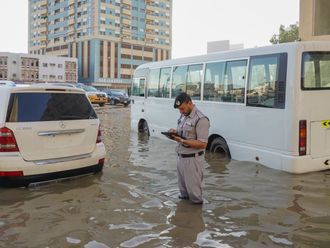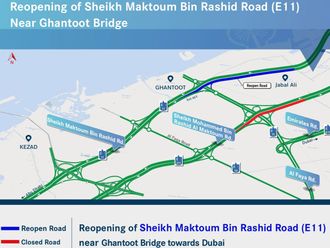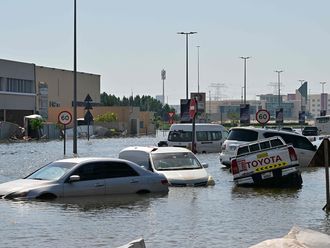Dubai: Twenty new Toyota Camry hybrid cars will be added to the Dubai taxi fleet, said RTA on Saturday.
The board of directors of the Roads & Transport Authority (RTA), chaired by Mattar Al Tayer, Chairman of the Board and Executive Director of the RTA, recently endorsed the operation of 20 hybrid vehicles, Toyota Camry make, as eco-friendly electric-fuel powered vehicles to be deployed in the Dubai Taxi fleet this year.
The move has been taken in the context of a Master Plan to curb pollution resulting from vehicles’ exhausts, and make vehicles more eco-friendly in Dubai, the RTA said in a statement yesterday.
“This move is taken in implementation of the directives of His Highness Shaikh Mohammad Bin Rashid Al Maktoum, Vice-President and Prime Minister of the UAE and Ruler of Dubai, to optimise the use of power in the UAE, considering its vitality for humans as well as development projects of all sorts, and the need to nurture a safe, clean, attractive and sustainable environment living up to the superb profile of Dubai emirate. The initiative is also taken in the framework of RTA’s commitment to safeguard lives and properties, conserve the environment and natural wealth, improve occupational health and public safety, and apply technological advancements necessary for curbing noises generated by transit means,” said Al Tayer.
“The RTA is making expeditious efforts to bring about a paradigm shift in the infrastructure of mass transit systems with a view to making them environment-friendly and capable of meeting the growing demand for transit means in the emirate,” he said.
Al Tayer explained that the underlying objective of operating hybrid vehicles was to consolidate the initiative of the Dubai Government aimed at introducing green vehicles for a cleaner environment, and assess the feasibility of using hybrid vehicles in the Dubai Taxi fleet.
“The RTA is the first entity in the region to embark on the trial run of fuel-electric hybrid vehicles within the Dubai Taxi fleet from 2008 to 2011. Results of this pilot operation showed that test vehicles have covered more than 550,000km without experiencing failures or major maintenance issues in major components. Fuel efficiency improvement amounted to 33 per cent, and carbon dioxide emissions dropped by 33 per cent as well. For instance the normal vehicle needs about 12½ litres of petrol to cover 100km, while the hybrid vehicle needs around 8.25 litres to travel the same distance. CO2 emissions of the normal vehicle are estimated as 182kg per day, whereas CO2 emissions generated by the hybrid vehicle measure about 121kg per day.
Environmental sustainability
“The RTA has undertaken plethora of projects and rolled out various programmes and initiatives aimed at conserving energy and the environment. These projects are highlighted by the Dubai Metro Project which has been manufactured at top-notch technological standards rendering it environment-friendly such as the use of electric power generated by brakes during the Metro operation for instance. The RTA has also superseded the ageing public transport bus fleet by buses compatible with the Euro 4-5 standards fitted with the Selective Catalytic Reduction (SCR) and the Exhaust Gas Recirculation (EGR) technologies. The RTA has also launched the operation of abras powered by Compressed Natural Gas (CNG) instead of diesel, as part of its endeavours to improve the marine transit service on board traditional abras shuttling between the two shores of the Dubai Creek. Recently, the RTA inaugurated the Green Bus initiative in response to the Green Economy initiative rolled out by His Highness Shaikh Mohammad Bin Rashid Al Maktoum, Vice-President and Prime Minister of the UAE and Ruler of Dubai. The Green Bus applies the latest green technologies in public transport industry, and uses biodiesel B05; which contains 5 per cent of recycled edible oil, and this small percentage is capable of cutting carbon emissions by as much as 78 per cent ,” elaborated the RTA Chairman of the Board and Executive Director.
Al Tayer concluded that optimising the use of power and conserving the environment has evolved as a culture and business methodology applied in all RTA’s projects and initiatives.












